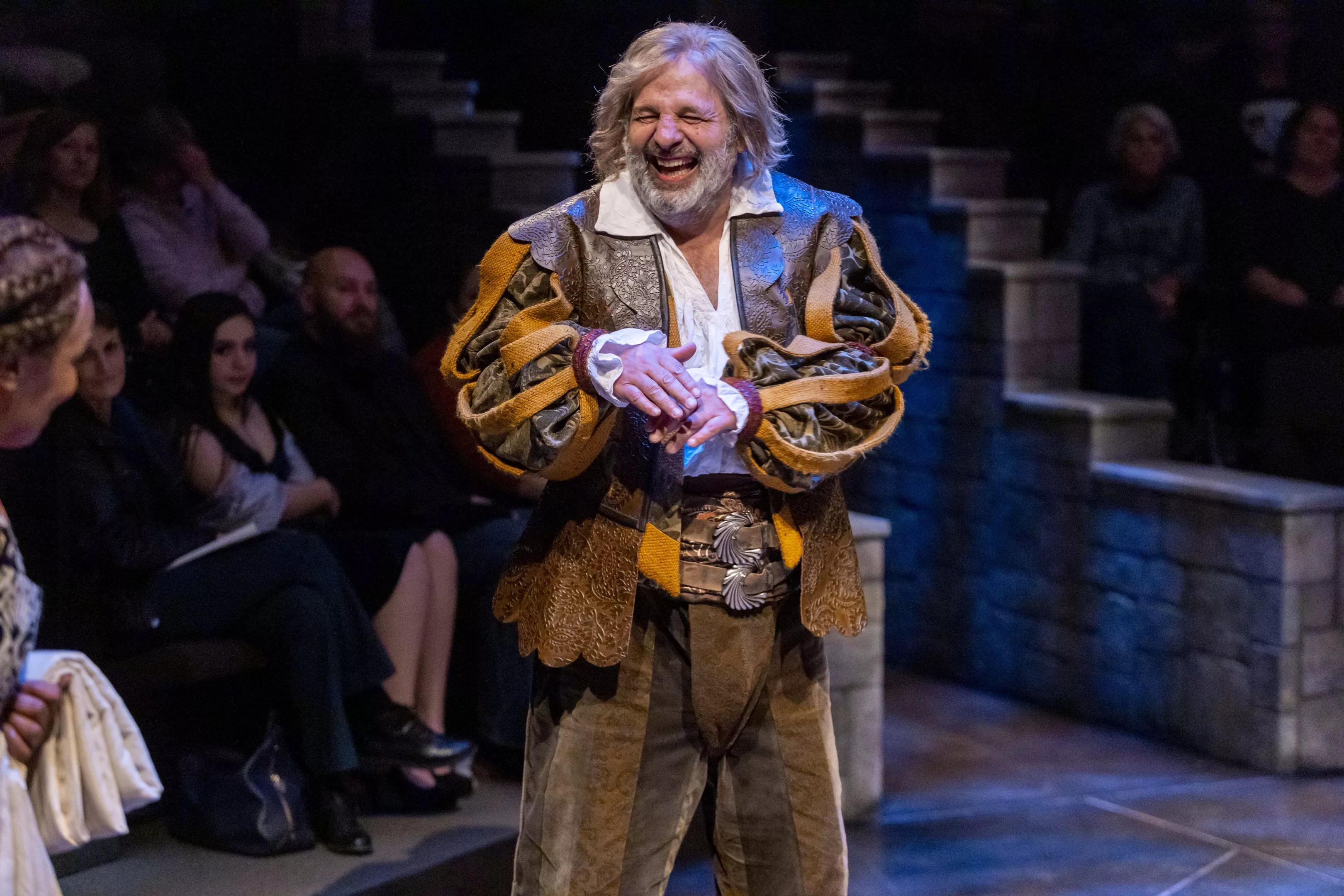
Adams VisCom

Audio By Carbonatix
A lot of directors just don’t trust Shakespeare. They’re so afraid he’ll bore you that they think up all kinds of stratagems for their productions. They change the period and location of the play – which works if something in that play suggests a new interpretation, but very often comes across as an act of desperation: Let’s set this Taming of the Shrew in 1940s America so everyone on stage can jitterbug. Or make Katherine a dominatrix with a whip. Hey, I’ve decided The Tempest is really about colonial subjugation; our Caliban will become the hero and represent all oppressed populations. If it’s a comedy, the director may decide just to go all-out funny. Which is fine, except that there’s stupid funny, with undisciplined improvisation and every character played for cartoonish laughs, and there’s smart funny, which may be new and creative but still fits with the humor and rhythm of the text.
Chris Coleman’s version of Twelfth Night at the Denver Center for the Performing Arts is smart funny. It’s also inventive, sometimes surprising and full of joyous life. I walked into the theater muttering grimly about having to sit through something like my thirtieth viewing of this play, and left exhilarated.
Twelfth Night, like A Midsummer Night’s Dream and As You Like It, is about love: the mysteries of love, how it distorts perception. There’s also something at the heart about the rigid way we think of the division between male and female. In Shakespeare’s comedies, it’s often the women who are the wisest, most courageous, witty and inventive characters. Many of these brilliant heroines find their fullness and freedom when circumstances cause them to masquerade as men. In Twelfth Night, we meet Viola as she emerges dazed from the storm-tossed sea, convinced that her beloved twin brother, Sebastian, has drowned, and asks the ship’s captain where they are. They’re in Illyria, he tells her – a mystical, magical place from the name alone. Viola disguises herself as a young lad to get a job with the lovestruck Count Orsino – who’s cleverly costumed here to underscore the fluidity of gender as a lush, sexy and somewhat epicene beauty. Viola rapidly becomes lovestruck herself.
Unfortunately, Orsino is pining for the beautiful Lady Olivia, who’s in seclusion because, like Viola, she’s mourning a dead brother. Viola is sent to court Olivia; Olivia falls for Viola; and when these two women share a scene, the air is electric with subtext, with all of love’s bafflement, anger, longing and sadness expressed in some of the loveliest poetry in Shakespeare.
These aren’t the only love stories. Olivia’s freeloading, larger-than-life cousin, Sir Toby, has persuaded his friend, Sir Andrew Aguecheek, to court her, and a lot of drunken comedy ensues. Sir Toby himself clearly has warm feelings for Olivia’s wickedly humorous maid, Maria. And there’s the darker, gloomier comedy of another servant, Malvolio, tricked into believing that Olivia desires him; the man’s a Puritanical ass, but the story of his humiliation is sometimes hard to watch. All of this is punctuated by a lot of comic foolery, and at the end, when all disguises have been removed and questions answered, love gloriously triumphs.
So what puts the gleam on this gleaming production? First and foremost, the performances: Corey Allen’s dignified Orsino, Larry Paulson’s bold Fool, Alex Purcell’s Sebastian – generally a throwaway part allotted to whichever actor can be made to look like his supposed twin, Viola, but here an interesting man genuinely thrown by all the insane contradictions flying his way: the beautiful woman he’s never seen before but who inexplicably loves him; the dear friend who, apparently out of the blue, accuses him of betrayal. It’s great to see Kim Staunton on stage again, contributing wit, richness and depth to scheming Maria. Lawrence Hecht is a wonderfully centered and humorous Sir Toby, and Cameron Folmar is the most insanely and adorably funny Sir Andrew I’ve ever seen. And I’m taking a moment here to re-savor Sam Gregory’s hilariously yellow-gartered Malvolio.
In many productions, these comic characters run away with the evening, but Mehry Eslaminia’s often puzzled and sometimes waspish Viola and Krystel Lucas’s beautiful, dignified Olivia more than hold their own.
You expect sumptuous productions at the Denver Center, and Twelfth Night doesn’t disappoint. Robert Mark Morgan’s set makes elegant and clever use of every level of the Space Theatre, and Orsino’s silken robes and Malvolio’s cross yellow garters are only two examples of the playful ingenuity of Kevin Copenhaver’s costumes. The lighting, by Charles R. MacLeod, glows warm. And in an inspired move, Coleman chose Tom Hagerman of Colorado’s much-acclaimed DeVotchKa to compose the music. The actors pick up and play instruments, and the sound – varied, surprising and just a touch wild – unifies the action, generously inviting the audience into a very special evening.
Twelfth Night, presented by the DCPA Theatre Company through December 22, Space Theatre, Denver Performing Arts Complex, 303-893-4100, denvercenter.org